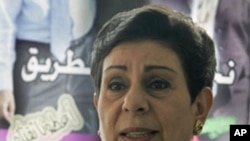Palestinians today set a one-week deadline for deciding whether to participate in face-to-face talks with Israel. Palestinian President Mahmoud Abbas made this announcement after a meeting today with members of the PLO Executive Committee. U.S. Middle East Envoy George Mitchell has asked Mr. Abbas to begin direct talks on Saturday. Mr. Abbas says Washington has assured him that if he agrees to direct talks, Israel will prolong a partial freeze on settlements. But the Palestinian leader is holding firm - he says no direct talks until Israel freezes all settlement activity, including East Jerusalmem. Dr. Hanan Ashrawi is a member of the PLO Executive Committee that met in the West Bank today.
Ashrawi: We reviewed the situation as is, and unfortunately, we haven't seen any serious commitments from President Obama or the Israelis that there will be compliance with the requirements, including cessation of settlement activities, including a commitment to a serious time frame, including commitments to the terms of reference and the end-game - the objectives of the negotiations.
So, in a sense, the proximity talks have not produced results, even though we were told that once there is progress in the proximity talks there will be movement towards direct negotiations. But there has been no progress. The Israelis have not provided any answers to the serious issues - whether it's dealing with borders or with security - and have not really stopped all settlement activity, particularly in and around Jerusalem.
So the situation is not very optimistic. Actually, it looks like it's a very bleak situation unless the Americans can come up with the political will to give us the assurances and commitments needed that the requirements of peace and the substance of negotiations will be honored.
Hilleary: I understand that Mr. Mitchell relayed a message from President Obama that if the Palestinians go to direct negotiations, the moratorium on the freeze in the settlements would be extended. But you're saying that in order to go to talks, that would already have to be accomplished.
Ashrawi: Well, there are no assurances. There are no guarantees. They've said they'll work on getting the moratorium extended, but I can tell you very frankly, there is no such thing as a moratorium. There are settlement activities ongoing. There are contracts that are being finished. There are public buildings that are being built, infrastructure that is being built, and Jerusalem is being transformed before our very eyes.
What we need is a cessation of settlement activities. And what we need is for Israel to comply with the requirements-including behaving in a way which is consistent with peace. They cannot continue to take the land and talk about a two-state solution or a land-for-peace equation.
And, too, almost twenty years ago, we were told, "Go to negotiations and this is the best way to stop settlement activities." For twenty years, we've been negotiating and we've seen our land disappearing before our very eyes. This has become extremely serious, and Palestinian public opinion is not open and is not willing to accept any more negotiations to be used by the Israelis as a cover to avoid accountability and to continue with their unilateral measures.
And it's the same thing with the PLO Executive Committee. It felt that the situation is extremely critical, and if the US President doesn't understand the danger inherent in Israel's continuing activities and lack of cooperation on the substantive issues, it means that there is something seriously wrong with the whole initiative for peace.
Hilleary: The Arab League is meeting in Cairo on the 29th, and Mr. Abbas has picked that day as a deadline for a decision. If nothing has changed, if the Israelis have made no concessions by that time, what then?
Ashrawi: Well, it's not concessions. What we need is compliance from the Israelis. That's the thing. The 29th is the Arab League Meeting, the follow-up Committee meeting, and after that, the President will come back to the Executive Committee of the PLO to take the final decision. And it seems to me what we need to do is go to the Security Council, go to the UN and of course follow up with issues of accountability for Israel.
If the US cannot stop Israel from behaving in an illegal manner, maybe there are other international courts and judicial addresses that will hold Israel accountable and make it stop settlement activities. And the same thing with the issue of a timeline and terms of reference for negotiations. If the Security Council can give us those, then we will proceed.
But it seems to me that the US still has the opportunity and we have been cooperating-to give us a timeline, to give us terms of reference, the objectives, the end-game, and to bring Israel into compliance with international law and to stop all settlement activities.




